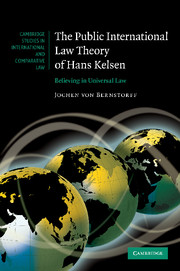Book contents
- Frontmatter
- Contents
- Preface
- Introduction
- PART I The quest for objectivity: the method and construction of universal law
- PART II The outlines of the cosmopolitan project – the actors, sources, and courts of universal law
- Postscript – on Kelsenian formalism in international law (2010)
- Career sketches: Hans Kelsen, Alfred Verdross, and Josef Laurenz Kunz
- Bibliography
- Index
- CAMBRIDGE STUDIES IN INTERNATIONAL AND COMPARATIVE LAW
Postscript – on Kelsenian formalism in international law (2010)
Published online by Cambridge University Press: 03 May 2011
- Frontmatter
- Contents
- Preface
- Introduction
- PART I The quest for objectivity: the method and construction of universal law
- PART II The outlines of the cosmopolitan project – the actors, sources, and courts of universal law
- Postscript – on Kelsenian formalism in international law (2010)
- Career sketches: Hans Kelsen, Alfred Verdross, and Josef Laurenz Kunz
- Bibliography
- Index
- CAMBRIDGE STUDIES IN INTERNATIONAL AND COMPARATIVE LAW
Summary
Interest in the history of the discipline of international law, in general, and in Hans Kelsen, in particular, has continued to grow in the years since the original publication of this study. Various reasons seem at play here: the study of the first high phase of the modern discipline of international law in the late nineteenth and early twentieth centuries may help to reassure a discipline that finds itself under growing pressure to justify its existence. What, after all, can international lawyers with their own epistemological traditions and sensibilities contribute to the conversation about global law that political scientists, economists, and sociologists cannot do equally as well or better? And when the debate revolves around the foundations of the discipline, Kelsen's name keeps cropping up and his project seems to assume new contextual relevance – after all, the awareness of a distinct legal methodology is at the heart of the Pure Theory of Law.
Or did the interest in the theoretical roots of the discipline perhaps grow out of the fact that we find ourselves since the beginning of the new millennium in a situation of political upheaval, crisis, and uncertainty, the resolution of which is still unclear when it comes to the future shape of international law? The cosmopolitan project of juridifying and institutionalizing international relations and its concrete emanations has been discussed among legal scholars with renewed – and not uncritical – vigor since the beginning of the new millennium.
- Type
- Chapter
- Information
- The Public International Law Theory of Hans KelsenBelieving in Universal Law, pp. 233 - 271Publisher: Cambridge University PressPrint publication year: 2010

